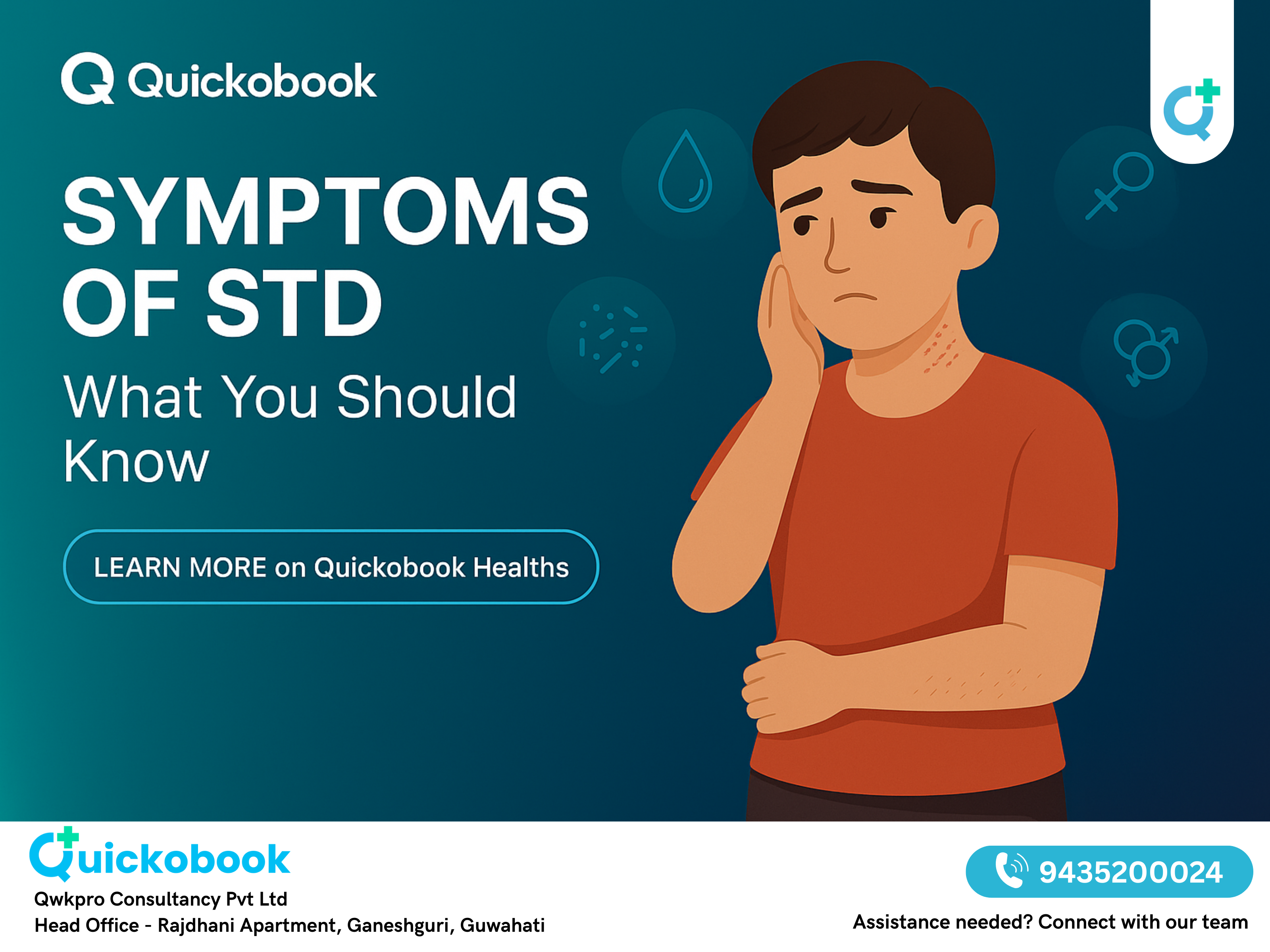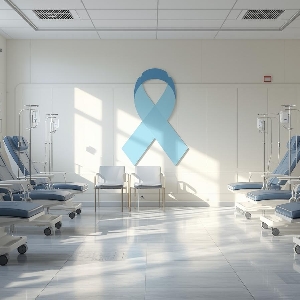Introduction
Sexually transmitted diseases (STDs), also known as sexually transmitted infections (STIs), are infections that spread through sexual contact. They are more common than people think, and anyone who is sexually active can be at risk. In India, millions of people suffer from STDs silently because they don’t recognize the symptoms early enough. Some infections are mild and curable, while others may cause lifelong health problems if left untreated.
The good news is that most STDs are treatable when detected early. If you ever notice unusual symptoms or have had unprotected sex, consulting a gynecologist (for women) or urologist (for men) is the safest option. With Quickobook, you can easily connect with top doctors and even book STD tests online at certified labs across India.
This in-depth guide explains everything you need to know about STD symptoms, causes, risk factors, complications, and treatment. By the end, you’ll also find answers to 50 commonly asked questions about STDs.
What Are STDs?
Sexually transmitted diseases are infections caused by bacteria, viruses, or parasites transmitted mainly through sexual activity. They can affect the genitals, mouth, anus, and even internal organs. Common examples include:
- Bacterial STDs: Chlamydia, Gonorrhea, Syphilis
- Viral STDs: HIV, Genital Herpes, HPV (Human Papillomavirus), Hepatitis B
- Parasitic STDs: Trichomoniasis, Pubic lice
While some of these are curable, others can only be managed but not fully eliminated from the body. Early detection is essential to prevent complications.
Common Symptoms of STDs
Not all STDs show visible signs in the beginning. In fact, many infections remain asymptomatic for months. However, when symptoms do appear, they can affect both men and women differently.
STD Symptoms in Women (Consult a gynecologist)
- Abnormal vaginal discharge (thick, yellowish, or foul-smelling)
- Painful urination or burning sensation
- Pain during sexual intercourse
- Unexplained bleeding between periods
- Genital ulcers, warts, or blisters
- Pelvic or lower abdominal pain
- Persistent vaginal itching or swelling
STD Symptoms in Men (consult a urologist)
- Discharge from the penis (white, green, or yellow)
- Pain or burning while urinating
- Swelling or pain in the testicles
- Genital sores, ulcers, or blisters
- Frequent urge to urinate
- Painful ejaculation
Symptoms Common in Both Men & Women
- Fever and fatigue
- Body rashes (common in syphilis)
- Painful anal or oral lesions
- Swollen lymph nodes in the groin
- Loss of appetite and weight loss (advanced HIV)
Causes and Risk Factors
STDs are mainly caused by unprotected sexual activity, but there are additional risk factors that increase the chances of infection:
- Having multiple sexual partners
- Not using condoms
- Sharing needles or razors
- Being in a relationship without regular STD testing
- Having a weakened immune system (such as in HIV patients)
- Lack of awareness and hesitation to seek treatment
How STDs Spread
- Vaginal, anal, or oral sex without protection
- Skin-to-skin contact with infected areas (warts, herpes blisters)
- Blood transfusion with infected blood (rare in India now due to screening)
- From mother to baby during pregnancy or childbirth
- Sharing personal items like razors, needles, or toothbrushes (hepatitis B, HIV)
Diagnosis of STDs
Early diagnosis can prevent long-term damage. Doctors use different tests depending on symptoms:
- Blood tests: Detect HIV, syphilis, hepatitis
- Urine tests: Identify chlamydia and gonorrhea
- Swab tests: Vaginal, cervical, or urethral samples
- Pap smear & HPV test: For cervical cancer screening in women
With Quickobook, you can easily book STD tests online and get reports from certified labs across India.
Treatment of STDs
Treatment depends on the type of infection:
- Bacterial STDs (chlamydia, gonorrhea, syphilis): Treated with antibiotics
- Viral STDs (HIV, herpes, HPV): Managed with antivirals and regular follow-ups
- Parasitic STDs (trichomoniasis, lice): Treated with specific antiparasitic medicines
???? Never self-medicate. Only a gynecologist or urologist can prescribe the correct dosage.
Lifestyle & Prevention Tips
Preventing STDs is much easier than treating them:
- Use condoms every time during sex
- Get HPV and Hepatitis B vaccines
- Avoid multiple sexual partners
- Go for regular health checkups
- Do not share needles, razors, or personal hygiene items
- Have open conversations with your partner about sexual health
When to See a Doctor
You should consult a gynecologist (for women) or a urologist (for men) immediately if you experience:
- Burning urination
- Unusual discharge
- Painful intercourse
- Genital sores or blisters
- Fever with rashes after unprotected sex
With Quickobook, you can instantly book doctor consultations online and avoid long waiting times.
READ ALSO: Things To Maintain During Pregnancy
Risks & Complications of Untreated STDs
Ignoring symptoms can lead to severe complications:
- Infertility in both men and women
- Chronic pelvic inflammatory disease (PID) in women
- Ectopic pregnancy
- Cervical cancer (caused by HPV)
- Chronic liver disease (hepatitis B & C)
- Miscarriage and birth defects in newborns
- Higher risk of acquiring or transmitting HIV
10 Frequently Asked Questions on STD Symptoms
Q1. What are the earliest symptoms of an STD?
A: Painful urination, unusual discharge, and genital sores are common early signs.
Q2. Can I have an STD without symptoms?
A: Yes, many STDs remain silent for months but still cause long-term harm.
Q3. Do men and women experience the same STD symptoms?
A: Some are similar, but women may also have irregular bleeding and pelvic pain.
Q4. What does STD discharge look like?
A: It may be white, green, yellow, or foul-smelling depending on the infection.
Q5. Can itching be a sign of STD?
A: Yes, genital itching may occur with herpes, trichomoniasis, or pubic lice.
Q6. Does HIV have early symptoms?
A: Early HIV may cause fever, sore throat, rashes, and weight loss.
Q7. How long after unprotected sex do STD symptoms appear?
A: Symptoms may appear within days or take weeks to months depending on the infection.
Q8. Can oral sex cause STDs?
A: Yes, herpes, HPV, and gonorrhea can spread through oral sex.
Q9. Are STDs curable?
A: Bacterial and parasitic STDs are curable; viral infections like HIV and herpes are manageable but not fully curable.
Q10. Can STD symptoms go away without treatment?
A: Some may reduce temporarily but the infection persists and worsens over time.
Conclusion
STDs are common but highly preventable and manageable when detected early. Ignoring symptoms can lead to infertility, cancer, and other life-threatening complications. If you notice unusual signs, don’t delay—consult a gynecologist or urologist through Quickobook and book an STD test instantly.
Quickobook CTAs
- Book an STD test online with certified labs
- Consult top gynecologists and urologists across India
- Get private, confidential, and hassle-free healthcare access










Comments (0)
No comments yet. Be the first to share your thoughts!
Leave a Comment